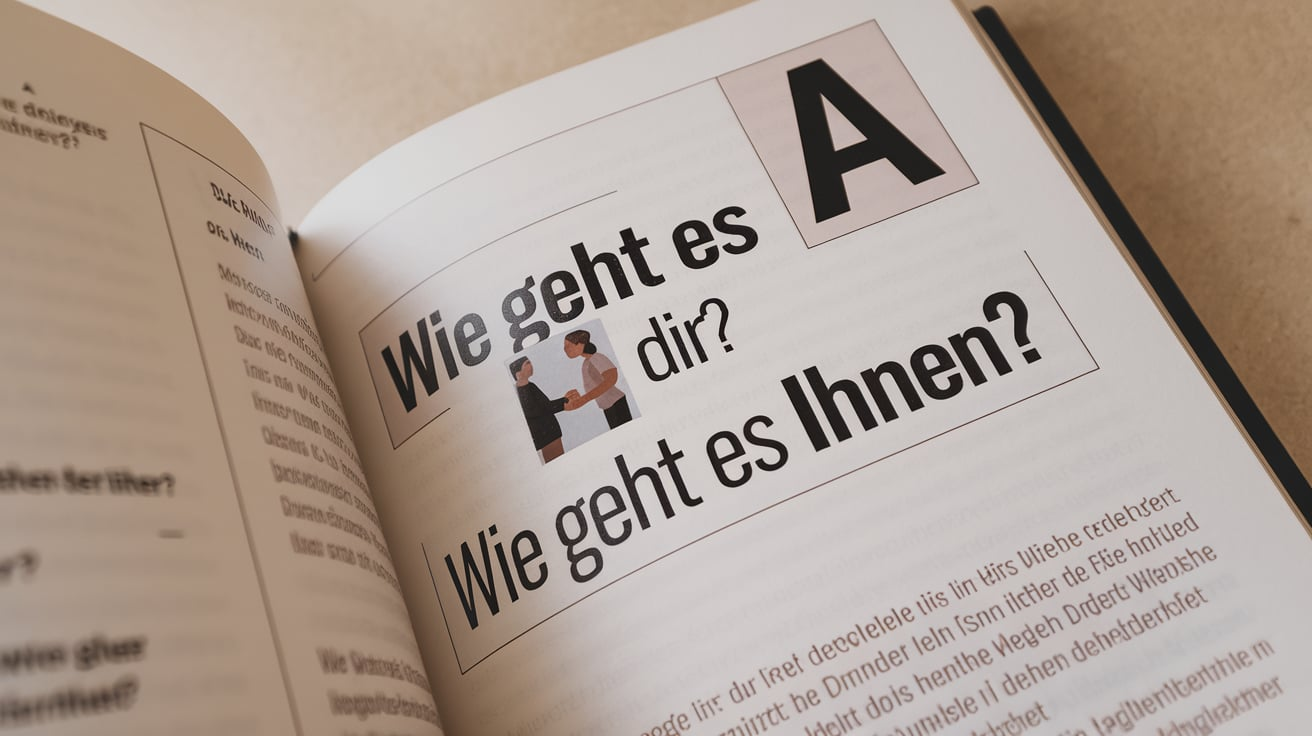Introduction
When learning a new language, one of the most important phrases to master is the question, “How are you?” This simple greeting helps start conversations, express concern, and build connections. If you’re interested in learning German or planning to visit a German-speaking country, knowing how to say “how are you in German” is essential. In this article, we will explore different ways to ask “how are you in German,” when to use them, and provide tips to improve your conversational skills.
Understanding “How Are You in German”
“Wie geht es dir?” It is customary to use this expression in relaxed, informal contexts when conversing with loved ones or acquaintances. In this context, “Wie” means “how,” “geht” means “goes,” and “es dir” refers to “you.” The phrase translates to “How is it with you?” but is understood as “How are you?”
For more formal conversations, such as with colleagues or people you don’t know, the correct way to say “How are you in German” is “Wie geht es Ihnen?”This instance differs in that formal “Ihnen” is used in place of colloquial “dir.” This version demonstrates the decency and civility that are necessary in contexts that are more formal or unfamiliar.
When to Use Formal vs. Informal Greetings
One challenge of learning to say “how are you in German” is knowing when to use formal versus informal language. In German culture, formal and informal language use is taken more seriously than in English. The key to mastering “how are you in German” is understanding when to use each form.
Informal (“du” form):
- With friends, family, or people of the same age
- In casual conversations
- When speaking to children or younger people
Formal (“Sie” form):
- In professional or business settings
- When speaking to an older or more powerful person
- With those you don’t know well or strangers
Using the correct form of “how are you in German” helps maintain respect and politeness. If in doubt, it’s always safer to use the formal version, “Wie geht es Ihnen?” unless you get a request to utilize the informal form.
Responding to “How Are You in German”
Once you’ve learned how to ask “How are you in German,” the next step is knowing how to respond when someone asks you the same question; there are several ways to reply, depending on how you’re feeling:
- “Mir geht es gut.” – This is the standard response to “How are you in German,” and it means “I’m doing well.”
- Mir geht es sehr gut.” -I’m doing very well,” you can say if you’re in the best possible mood.
- “Es geht.” – This is a more neutral response, translating to “It’s going” or “I’m okay.”
- “Nicht so gut.” – If you’re not feeling well, you can say, “Not so good.”
These responses help you continue the conversation after someone asks, “How are you in German?” You can go into further depth about your day or your feelings, depending on the mood and environment.
Practice Makes Perfect
Learning to say “how are you in German” is the first step. To become confident in using this phrase, it’s important to practice regularly. To help you get better, consider these pointers:
- Practice with Native Speakers: One of the best ways to master how to say “how are you in German” is to practice with native speakers. Engaging in conversation, whether through language exchange programs or online apps, helps you get comfortable with the language.
- Listen to German Media: Listening to German podcasts, watching German TV shows, or following German YouTube channels can give you more exposure to everyday conversations. Pay attention to how people ask and answer the question, “How are you in German?” in different situations.
- Use Flashcards: Create flashcards with different ways to ask “How are you in German?” and practice using them in different contexts. This method helps reinforce your memory and provides a quick reference for reviewing.
- Join Language Classes: If you’re serious about learning German, joining a language class can provide structure and guidance. Whether in person or online, language courses help you understand not just how to say “how are you in German” but the broader grammar and cultural nuances of the language.
Cultural Aspects of Greetings in Germany
Understanding how to say “how are you in German” also involves learning the cultural significance of greetings in Germany. Germans tend to value straightforwardness and efficiency in their communication, so small talk is often less common than in some other cultures. However, showing interest in how someone is doing is still important.
When greeting someone, it’s customary to make direct eye contact and offer a firm handshake, especially in formal settings. In more casual situations, a friendly “Wie geht’s?” or “Alles gut?” is appropriate. Germans may also appreciate it if you take the time to ask follow-up questions or share how you’re doing in return.
Conclusion
Mastering how to say “how are you in German” is a vital part of learning the language and understanding the culture. Whether you’re using the informal “Wie geht es dir?” or the formal “Wie geht es Ihnen?”, this greeting is key to initiating conversations and building connections. By practicing different variations of the phrase, responding appropriately, and understanding when to use formal or informal language, you can become more confident in your German-speaking abilities.
The question “How are you in German?” opens the door to many conversations, whether you’re traveling in Germany, speaking with native German speakers, or just expanding your language skills. By investing time in learning this simple yet essential phrase, you’ll be one step closer to fluency and better communication in German.
